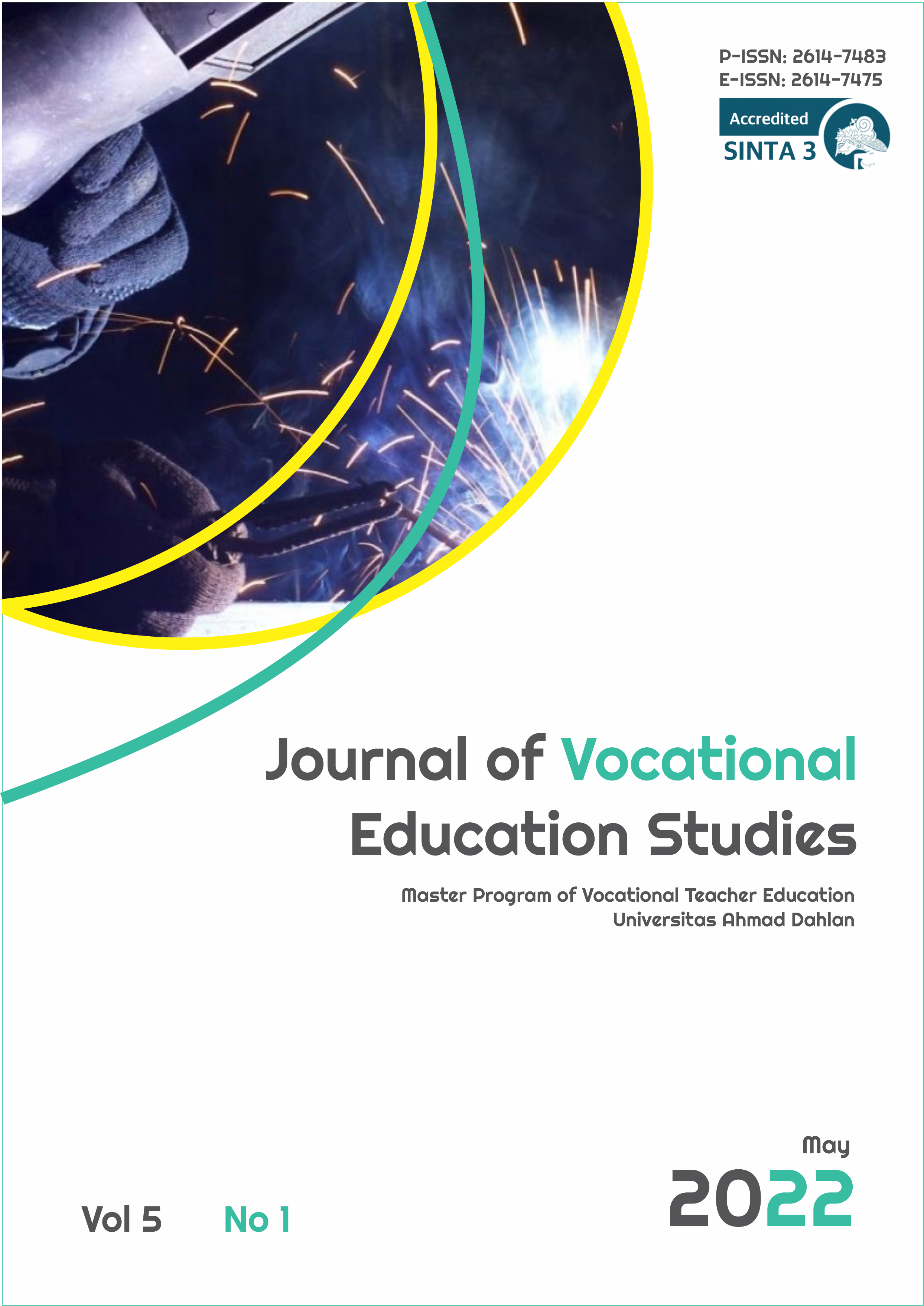Quality of Educational Facilities and Graduate Employability Competences in Lagos State Nigeria
DOI:
https://doi.org/10.12928/joves.v5i1.5916Keywords:
Educational Facilities, Graduate employability competences, Educational Output , ICTAbstract
This research work examined the relationship between quality of educational facilities and graduate employability competence in Lagos state. The study was carried out in different NYSC zones using 256 NYSC members which are selected through the simple random sampling techniques from the different NYSC zones in Lagos State. In order to achieve the aim of this study, 3 research questions and 2 hypotheses were formulated. A questionnaire titled quality of educational facilities and graduate employability competences (QEFGEC) was developed by the researchers. The research instrument was administered through google form, the questionnaire was designed online and responses were gathered online. Before the instrument was administered, it was subjected to face and content validity by 2 professionals in the field of Educational Management and Measurements and Evaluation in University of Lagos and Ekiti State University. Also, in ensuring the reliability of the used instrument, a pilot test was carried out using 20 NYSC members in Lagos. Using the Cronbach’s alpha reliability method, the instrument had a reliability coefficient of 0.74. The instrument was self-administered to the respondents and responses were gathered within few days due to the aid of ICT. The data gathered on the research questions from the field was analyzed using a simple percentage, means, standard deviation while the research hypothesis was tested using inferential statistics. It was discovered that there is a significant relationship between availability, utilization of educational facilities and graduate employability competences. It was therefore recommended that Tertiary institution head must ensure that all needed facilities are provided for effective utilization by the teachers and students, also Government and all education stakeholders should provide adequate funding for the tertiary institution because without quality output, the objective of education in national development will not be achieve and lastly Student and lecturers should be encouraged to use, manage and maintain the limited educational facilities provided adequately
References
Abolade, A. O. & Yusuf, M. O. (2005) Information and Communication Technologies (ICTs) and the Nigerian Teacher Education Program. African Journal of Educational Studies, 3(1), pp 1-19.
Ayodele, J. B., & Ogbiye, C. A. (2018). Resource availability and internal efficiency of secondary schools in Ekiti State, Nigeria. International Journal of Educational Foundations and Management, 12(1), 204-208.
Kolawole, A. O. & Ogbiye, C. A (2020), Resource Utilization and Internal Efficiency of Secondary Schools in Ekiti State, Nigeria, International Journal of Education, Learning and Development Vol. 8, No.5, pp.11-20, May 2020 Published by ECRTD-UK Print ISSN: 2054-6297(Print), Online ISSN: 2054-6300(Online)
Obikwelu, C. N (2014), Resource Quality And Service Delivery In Selected Universities In South East Nigeria, A Thesis Submitted To The School Of Postgraduate Studies, University Of Lagos In Partial Fulfillment Of The Requirements For The Award Of The Degree Of Doctor Of Philosophy (Ph.D) In Educational Administration
Odia, L. O. & Omofonmwan, S. I. (2007). Education system in Nigeria: Problems and prospects. Journal of social science, 24(1); 81-86
Olelewe, C. J, Nzeadibe, C. A, Nzeadibe, C. T (2014), Availability and Utilization of Educational Resources in Selected Rural Communities of Enugu State: Implications for Achieving Universal Primary Education of Millennium Development Goals (MDGs) in Nigeria, Educational Research International Vol. 3, No. 1, February 2014, ISSN: 2307-3721
Onyeike, V. C. & Onyeagbako, S. O. (2004), Enhancing Employability Through University Education: The Role of National University Commission (NUC), Global Journal of Educational Research Vol 13, 2014: 109-115 Copyright© Bachudo Science Co. Ltd Printed in Nigeria. ISSN 1596-6224 www.globaljournalseries.com; Info@globaljournalseries.com
Usen, F. M, Garieth, O. O, Valentine, J. O & John A. E (2019), Analysis of the Quality of Educational Resources and Effective Instructional Service Delivery in Nigerian Universities, International Journal of Education and Evaluation, E-ISSN 2489-0073 P-ISSN 2695-1940 Vol 5. No. 7 2019 www.iiardpub.org
Yorke, M., 2004. Employability in Higher Education: what it is – what it is not, Higher Education www.employability.ed.ac.uk/what
Downloads
Published
Issue
Section
License
Copyright (c) 2022 Universitas Ahmad Dahlan

This work is licensed under a Creative Commons Attribution-ShareAlike 4.0 International License.
Authors who publish with Journal of Vocational Education Studies (JOVES) agree to the following terms: Authors retain the copyright and grant the Universitas Ahmad Dahlan right of first publication with the work simultaneously licensed under a Creative Commons Attribution License (CC BY-SA 4.0) that allows others to share (copy and redistribute the material in any medium or format) and adapt (remix, transform, and build upon the material) the work for any purpose, even commercially with an acknowledgement of the work's authorship and initial publication in Universitas Ahmad Dahlan. Authors are able to enter into separate, additional contractual arrangements for the non-exclusive distribution of the journal's published version of the work (e.g., post it to an institutional repository or publish it in a book), with an acknowledgement of its initial publication in Universitas Ahmad Dahlan. Authors are permitted and encouraged to post their work online (e.g., in institutional repositories or on their website) prior to and during the submission process, as it can lead to productive exchanges, as well as earlier and greater citation of published work (See The Effect of Open Access).










.png)



